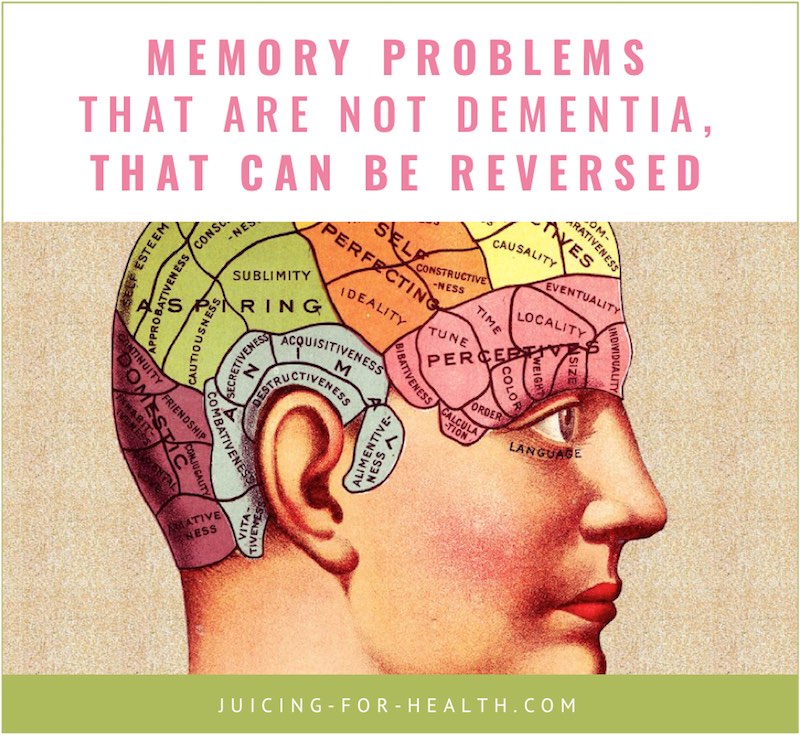Serious Memory Problems That Are Not Dementia, That Can Be Reversed
Last updated on
According to a recent survey conducted by the Centers for Disease Control and Prevention (CDC), 1 in every 9 adults aged over 45 years experiences memory problems, which often are the earliest symptoms of Alzheimer’s disease and other forms of dementia.
What’s even worse is that more than half of these adults (who experienced memory problems over the last 12 months) didn’t visit a doctor to discuss the issue. Most of them thought that this memory decline was just a normal thing for their age group.
It’s not. Memory decline is NOT a normal part of aging.
If you noticed your memory isn’t as sharp as it used to be, or if you know someone who’s currently dealing with memory problems, remember that this is an issue that can often be reversed quite easily.

Common Causes Of Memory Problems That Are Not Dementia
Let’s take a good look at the most common causes of reversible memory problems.
Researchers now know, and call our gut the “second brain”. If you noticed below, all the causes of memory problems start in the gut.
Nutritional imbalances, ingestion of chemicals and drugs, stress (that causes issues in the gut)—they all begin in the gut. So, it makes sense to reverse the problem, also through the gut!
1. Nutritional Imbalances And Deficiencies
Your diet has a tremendous impact on your memory, attention, focus, and all other functions of your brain.
- Eating too much fat and sugar may impair different forms of memory
- Memory loss is present in 84.2% of patients with vitamin B12 deficiency
- Vitamin D deficiency was linked to visual memory loss
- Omega-3 deficiency was associated with cognitive decline
In other words, to keep your memory sharp throughout the years, it’s important to follow a well-balanced diet rich in all the essential micro and macronutrients.
2. Consumption of Artificial Food Additives
There are hundreds of commonly used artificial food additives out there—preservatives, food colorings, flavor enhancers, sweeteners, and many more. Although the general opinion is that they are relatively safe for human health, studies suggest that things aren’t that simple.
For example, animal studies indicate that exposing female rats to a mixture of common food dyes results in impaired learning and memory in their offspring.
A similar effect, although milder, was observed when adult rats and mice were given tartrazine, a common yellow food colorant.
The point here is that we can’t be 100% sure that artificial food additives are safe in terms of memory, but we do know that they don’t provide any benefits at all.
So isn’t it better to avoid them? Natural is always better, as far as nutrition goes!
3. Side Effects of Medications
Many conventional drugs can cause memory problems, both short- and long-term. However, most of these changes are reversible over the course of several months after you stop taking the medications in question.
According to the American Association of Retired Persons (AARP), the most common pharmacological culprits of memory problems are:
- Benzodiazepines (anti-anxiety and sedative drugs)
- Statins (cholesterol-lowering drugs)
- Antiseizure drugs
- Opioid painkillers
- Medications for Parkinson’s disease
- Beta-blockers (antihypertensive drugs)
- Some sleeping aids
- Anticholinergic drugs (often used to treat incontinence and overactive bladder)
- First-generation antihistamines (anti-allergy drugs)
Of course, this doesn’t mean you should stop taking any of these meds before discussing the matter with your doctor.
The best step-by-step process would look like this:
- Tell your doctor you have been dealing with memory problems lately, and that you suspect this may have something to do with the medications you’re currently taking
- Discuss available alternatives—other meds, smaller doses, etc.
- Agree on a solution to try out and on a term after which you will evaluate the effectiveness of the new approach together.
Rinse and repeat, while also correcting your diet. Some of these medications may cause depletion of certain nutrients in your body, so it makes sense to also take these supplements, until you see improvements!
4. Stress and Physical Inactivity
Stress, especially chronic stress, is a well-known risk factor for Alzheimer’s disease and other memory problems. Being physically inactive and leading a sedentary lifestyle are other risk factors for cognitive decline.
And here’s the punchline: studies indicate that stress makes people less likely to be physically active, even though exercising significantly reduces perceived stress. It’s a vicious cycle: being stressed drives you away from one of the most effective ways of being less stressed.
In other words, by engaging in physical activity you can basically kill two birds with one stone and get rid of two possible reasons for memory problems!
Working out improves the blood flow throughout your body, meaning your brain will receive more oxygen and nutrients, which directly leads to better memory.
5. Mercury and Other Heavy Metal Poisoning
Heavy metal poisoning is another fairly common reason of memory problems in any age group. Mercury is known to head straight to the brain, once ingested, causing many brain issues.
Contaminated crops, water, air pollution—all of these can be sources of heavy metals that get deposited in the tissues of your body and gradually decline their functions. Brain functions are no exception:
- Mercury toxicity is often characterized by memory problems, depression, and chronic fatigue
- Cadmium toxicity was linked to problems in olfactory memory and general cognitive decline in animal studies
- Cobalt and chromium toxicity has been linked to depression and short-term memory as well
Although we can’t really change the global ecology, we can support the natural resources of our bodies to combat the heavy metals we interact with.
- Eat more fresh vegetables and fruit for antioxidative support
- From time to time, engage in a heavy metal detox using natural chelating foods like wheatgrass, garlic, cilantro, and green tea
Gastrointestinal Disorders
Before diving into eating brain-boosting foods and taking the targeted supplements, doing a gastrointestinal cleanse can help clear up a lot of old feces that are causing your gut to be sluggish. With a good gut cleanse, your body will be able to absorb these nutrients way better.
The following groups of individuals with memory problems or brain fog, most likely also have gastrointestinal disorders and infestations of harmful microbes—bacterial, yeasts (Candida) and/or parasitical:
- Being on long-term medications
- Eating a diet that is mainly processed foods that contain high amounts of artificial food additives
- Suffering from extended periods of stress
- Having heavy metal poisoning
If you fall into any of these groups, you may have the following symptoms, other than memory problems:
- Irritable bowel syndrome
- Chronic constipation
- Ulcerative colitis
- Diverticulosis
- Gas and bloating
- Abdominal distension
- Crohn’s disease
Alongside the gastrointestinal cleanse, doing a parasite cleanse is also essential in “cleaning up” the body for better function. Once the gut is healed, chances are high that your memory problems will be reversed.
Natural Brain Boosters
Of all the natural ways to boost your brain power (on top of doing the proper cleanses) in general and memory specifically, these foods are the most effective ones—and they’re backed by scientific studies!

Try out these natural remedies:
- Green juices are one of the first things that you must include in your daily routine, to help improve your brain health. Green juices heal your gut, purify your blood, and improve blood flow that carries more oxygen and nutrients to your brain. The more oxygen and nutrients you get into your brain, the better your brain function will be. The healthier your gut is, the healthier your brain will be. Cilantro and parsley are two best greens to use for this purpose.
- Virgin coconut oil improves memory by supporting the brain’s signaling molecules, reducing oxidative stress, and enhancing antioxidative efficiency. Clinical studies reported that Alzheimer’s patients fed 2.7 tablespoons of coconut oil daily, to have improvements in cognitive status.
- Curcumin, the main polyphenol of turmeric, has anti-inflammatory and neuroprotective action, improves memory and learning.
- Ginkgo biloba improves blood flow in the brain, has antioxidative and anti-inflammatory features, and is effective in improving cognitive function and even treating diagnosed dementia.
Conclusion
Memory problems shouldn’t be taken lightly, no matter the age group: they are never a normal part of aging. Moreover, memory problems aren’t necessarily signs of something terrible and irreversible.
In many cases, memory problems can be reversed if you know where to look for the reason. Conventional medications, dietary deficiencies, physical inactivity, and even just chronic stress—all of these can lead to memory decline.
The good news is that all of these causes can be alleviated or even fully reversed if you take action and approach the matter with care.
Some of the links I post on this site are affiliate links. If you go through them to make a purchase, I will earn a small commission (at no additional cost to you). However, note that I’m recommending these products because of their quality and that I have good experience using them, not because of the commission to be made.
Comments
Leave a Reply

































 JOIN OVER
JOIN OVER
Hello, I am from Greece,
please look in the web long enough to find out if they do
Omega 3 I have to take them only.
I am currently getting for (Homocysteine and my memories Vitamin B12 Folic Acid, D 3 + K) Do I Have Any Effects With Ω3?
THANK YOU IN ADVANCE
HAPPY SUMMER
Thank you for an excellent coverage and encouragement and expose of the truth of memory loss and all it’s causes. You could almost say it’s an allergic reaction to the ailing world we live in.
My memory have been declining over the years and at first I thought I was inheriting the genes from both my parents who suffered with the disease for years, my mother first, and eventually passed away within two years of each other. I was diagnosed with Lupus and Fibro and blamed my memory issues on these two. Then add covid to the party and the brain fog was intensified. Reading your article have given me a flicker of hope. I am certainly going to turn my life around and start taking my memory back, if its not too late, Thank you.